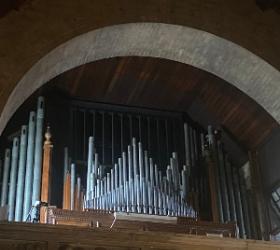
1998 World Congress Report
The 11th Carillon World Congress was held in Mechelen, Belgium, August 9-13, 1998. The welcoming recital was performed in the tower of St. Rombouts Cathedral by Jo Haazen, director of the Royal Belgian Carillon School. Other recitals that day were given by Patrick Macoska (Michigan), Adrian Gebruers (Ireland), Anna Maria Reverté (Spain), Arie Abbenes (The Netherlands), Timothy Hurd (New Zealand), Koen Van Assche (Belgium), Adrien Tien (Australia), Erik Vandevoort (Belgium), Xia Hua (China), and Liling Huang (Taiwan). A lecture on "75 Years Royal Carillon School in Mechelen" was given by musicologist Koen Cosaert, an instructor at the school. This was followed by a film, produced by Toshi Sakurai, documenting the school's history. The last two of the six finalists in the Queen Fabiola Competition played in the evening, and we were graced by the presence of Queen Fabiola herself. The winner was Tom Van Peer of Belgium. Second place was awarded to Belgian carillonneur Liesbeth Janssens.
The second day began with a recital by Helen Hawley (Kansas) who exclaimed that "it really was 441 steps up to the cabin in the St. Rombouts tower--there aren't even hills that high in Kansas!" Recitals that day were also given by Jeffrey Bossin (Germany), Frank Müller (Germany), Nico Swaenen (Belgium), Trevor Workman (England), Karel Keldermans (Illinois), and Carlo van Ulft (The Netherlands). Xia Ming Ming, director of the Museum of Antique Bells in Beijing, gave a lecture on bells excavated from the tomb of Zeng Hou Yi, the Marquis of Zeng, and on bells in ancient China. Liling Huang and Xia Hua provided musical intermezzi on traditional Chinese instruments. Alexander Iarechko, president of the Russian Association of Bell Culture, gave a lecture on the art of bell ringing in Russia. The vocal/instrumental trio Zolotoj Pljos from Zaratov, Russia (students at the Belgian Carillon School), performed musical intermezzi of traditional Russian folk music. The day concluded with a concert of carillon with guitar and brass quintet featuring Eddy Mariën (Belgium) on the Busleyden carillon.
Tuesday August 11 was a travel day. The group first went to Grimbergen where a lovely concert of Gregorian chant was performed by organ and a men's choir inside a church. Once outside, a carillon concert based on Gregorian chant was heard. The concerts were followed by the obligatory drink of beer, and lunch, both offered by the town of Grimbergen. The group then traveled to Holsbeek to visit the Clock-O-Matic Company where lectures on the carillon console were presented. Karel Keldermans explained the standards set forth by the GCNA. Timothy Hurd spoke about his studies of the use of the keyboard, and the Clock-O-Matic representative discussed their data gathered from electronically monitoring the movement of a player's arm during a carillon performance. The day ended with a gala dinner at the Horst Castle on the edge of a lovely wooded lake where we were welcomed by a concert for carillon and concert band.
On Wednesday, the day's activities took place in Louvain, Belgium. Recitalists that day included Ann-Kirstine Christiansen (Denmark) on the University Carillon in Leuven. This carillon has a video system so that performers can be observed by the audience. Rosemarie Seuntiëns (The Netherlands) and Frank Steijns (The Netherlands) performed on a mobile carillon for the lunch hour. Henk Verhoef (The Netherlands) and Andreas Friedrich (Switzerland) performed on a mobile carillon during the evening meal which was served in the Begijnhof garden. A concert of contemporary music was given by Klaas de Haan (The Netherlands), Brian Swager (California), and Carl Van Eyndhoven (Belgium) on the University Carillon, with each performer playing new Dutch, American, and Belgian carillon music, respectively. The rest of the day was filled with various lectures which were given in a very warm room in a university building. The evening was reserved for "9 O'Clockworks," a musical happening on the large square facing the University Library. The Ghent bellman walked around the square introducing performances by various bell groups such as Valencian bell tollers, an Indonesian gamelan ensemble, Russian bell ringers, a mobile carillon, and the University Carillon. The happening concluded with a jam session.
David Hunsberger (California) performed the opening recital of the final congress day. Other recitals that day were given by Koen Cosaert (Belgium), Stefano Colletti (France) and Annick Ansselin (Australia). Sjoerd Tamminga (The Netherlands) played on the carillon in St. Peter's Church in Leuven. Several lectures were presented that day including papers by Margo Halsted (the carillon music of Johannes Volckerick), Brian Swager (the carillon repertory of Gustaaf Brees), and Karel Keldermans (Gillett & Johnston). A prelude to the closing session was the music of Matthias Van den Gheyn--including two carillon preludes--performed on harpsichord by Frank Agsteribbe (Belgium). Adrian Gebruers (Ireland) was announced as the new president of the World Carillon Federation. An evening of festive performances heralded the unveiling of the city of Leuven's new jacquemart "Meester Jan." Theban trumpets sounded, a mobile carillon and a renaissance brass quintet accompanied a renaissance dance ensemble, Arie Abbenes and Bob van Wely played a duet on the St. Pieters carillon, and the mobile carillon and a vibraphone accompanied ballet dancers in the Nutcracker Suite. An elegant reception in the University Hall was the final event in a most memorable Congress.




